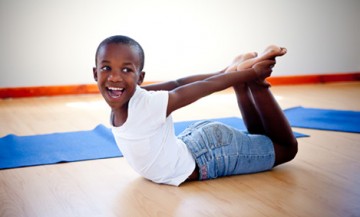
Following their LifeForce Yoga workshops and trainings, I’ve talked to many classroom teachers, from elementary to high school to special needs, who have noticed a marked change in students’ behavioral issues like hyperactivity, as well as positive mood changes and in their students’ ability to focus, after the teacher introduced a simple yoga practice, adapted for the classroom. While their stories are interesting, and I’ve mentioned a few of them elsewhere, (Yoga Skills for Therapists), these accounts are anecdotal and not evidence based. However, thanks to the efforts of dedicated researchers at Brigham and Women’s Hospital Harvard Medical School, at Kripalu, at Brown University and elsewhere, we have two new preliminary studies that continue to suggest that a yoga class may 1) reduce cortisol level (stress hormone) and teacher-perceived stress in an elementary aged population and 2) provide stress-reducing benefits for high school aged adolescents that include reduction in anger, depression and fatigue as compared to a standard high school physical education (PE). These two new studies join a growing number of pilot studies that suggest that the benefits of yoga that adults experience in reducing physiological and psychological stress are also observed in children and adolescents in school-based settings.
The first article referred to above appears in the Journal of Evidence-Based Complementary & Alternative Medicine and is based on an uncontrolled study. This means that the students were measured against themselves, before and after the intervention, as opposed to a control group who did another activity like PE. 18 Second graders and 18 third graders, whose parents had given permission, were offered a 10-week, once-a-week, in classroom course that followed the Yoga 4 Classrooms protocol, developed by Lisa Flynn. The 30-minute session included breathing exercises, physical exercises and postures, meditation techniques and relaxation. Unique to this in-classroom approach is the fact that “students kept their shoes on and remained seated or standing next to their desks, while practicing yoga posture variations.” The poses were adapted to the student’s physical abilities, while the students were encouraged to “listen to their bodies” and had permission to modify the pose. The relaxation for classroom use was also unique. “Relaxation involved students progressively relaxing into ‘‘Desk Rest Pose’’ (heads down on the desk) while listening to a themed visualization, followed by a closing song/chant and a few final deep breaths. To read more about this approach to in-class yoga, click here.
Students’ salivary cortisol (the stress hormone) responses were assessed at 3 time points. Classroom teachers also documented their perceptions of the effects of the intervention on students’ cognitive, social, and emotional skills. Second graders showed a slight decrease in cortisol from before to after the 10-week yoga intervention. However, when presented with a challenging cognitive task both grades showed significant decreases in cortisol from before to after the task. Lead author Bethany Butzer says, “the fact that the objective data (cortisol) showed a pattern of change that was consistent with the subjective data (teacher ratings) lends at least some credence to the possibility that the changes might have been due to the intervention. Specifically, 2nd graders, but not 3rd graders, showed a decrease in baseline cortisol from before to after the intervention. Consistent with the findings for cortisol, the second grade teacher observed greater improvements in his/her students’ cognitive, social, and emotional skills.”
This study suggests that the second grade students’ psycho-social improvement may be linked to the reduction in cortisol attributed to the yoga intervention. In reflecting on the difference between the second and third grade, Lisa Flynn, author of Yoga for Children and the Yoga 4 Classrooms Activity Card Deck, who designed the yoga protocol and trained the classroom teachers, said, “It’s interesting to note, that the 2nd grade classrooms had more children with special needs diagnosis than did the 3rd grade classroom. By all accounts, these were the children who seemed to benefit the most from the intervention.”
Although not conclusive, the study points, along with others, to the efficacy of including yoga in the schools to help students cope with stress and regulate their emotions and their behavior.
Butzer B1, Day D2, Potts A2, Ryan C2, Coulombe S2, Davies B2, Weidknecht K2, Ebert M3, Flynn L4, Khalsa SB5, “Effects of a Classroom-Based Yoga Intervention on Cortisol and Behavior in Second- and Third-Grade Students: A Pilot Study.” Journal of Evidence-Based Complementary & Alternative Medicine, November, 2014.
You can read the abstract here.
In the second study, one Kripalu Yoga in the Schools (KYIS) class, developed by the Kripalu Institute for Extraordinary Living, was compared to one PE class in a high school setting. The students participated in the KYIS intervention for 3 weeks with five lessons per week (15 lessons total) in non-consecutive weeks that alternated with PE. Students completed self-report psycho-social measurements immediately before and after a single KYIS yoga class and a single PE class one week later.
While the 47 students who participated in both PE and yoga reported significant decreases in confusion and tension, with no significant difference between the two groups, there were significantly greater decreases in anger, depression, and fatigue from before to after yoga compared to PE. In addition, the researchers found significant reductions in negative affect after yoga but not after PE.
While the second study included a control group, neither study was randomized and both were small. But these two studies join an expanding body of preliminary research in this area, ripening the field for a major, well-funded investigation.
Joshua C. Felver & Bethany Butzer & Katherine J. Olson & Iona M. Smith & Sat Bir S. Khalsa, “Yoga in Public Schools Improves Adolescent Mood and Affect,” Contemporary School Psychology, Sept., 2014
You can read the abstract here.
If you have questions about either study or would like to see a PDF, contact Bethany Butzer through her website at http://www.bethanybutzer.com/.